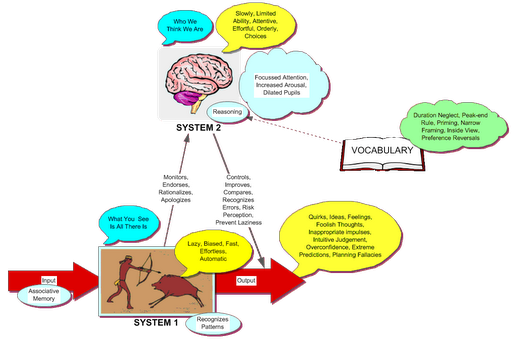
Many people regard Reasoning the opposite of Intuition. Reasoning is rational thinking using logic, while Intuition is unconscious, a paranormal gift, a magical awareness not accessible for normal humans, or a connectivity to an all knowing esoteric field.
However, psychologists have proposed a dual-process theoryof the mind. The output of “thinking” could be the result of two hypothesized processes. Often, the two processes consist of an implicit (automatic), unconscious process and an explicit (controlled), consciousprocess.
Daniel Kahneman, in his book Thinking, Fast and Slow, summarizes research that he conducted over decades about human thinking errors.

He assumes that System 1 recognizes patterns from the associative memory. System 1 is lazy, biased, automatic, and performs nearly effortless. It produces quirks, ideas, feelings, foolish thoughts, inappropriate impulses, intuitive judgements, extreme predictions and planning fallacies. It provokes overconfidence.
A hypothesized System 2 is involved in deliberate Reasoning. It focuses attention, but is not effortless. The activating of System 2 processes can be perceived by dilated pupils and increased arousal. The function of System 2 is to prevent disastrous outcomes of System 1 processes, however the performance of System 2 is rather poor. It has a limited ability, has to be used deliberately and is slowly. It monitors System 1, endorses, rationalizes and apologizes for the output of System 1. Because of the flaws System 1 could produce it has many tasks to do: controlling System 1, improving, comparing, recognizing errors and perception of risks. The main purpose of System 2 is to prevent the laziness of System 1 in assuming that what you see is all there is.
Some scientists assume that System 1 and System 2 are physically different located in the brain. Also, that System 1 is evolutionary older than System 2. System 1 developed as a need of Early Humans for fast Fight or Flight decisions, closely linked to sympathetic nervous system.
In order to prevent the systematic errors System 1 produces, especially in complex reasoning tasks, Kahneman stresses that we need to reflect on our thinking processes. He concludes that we have developed poor tools, that we are missing a vocabulary to think and to communicate about our thinking. In Thinking, Fast and Slow, there are some hilarious examples of this Thinking Vocabulary.
Some concepts Kahneman mentions, all responsible for several biases, are
- Duration neglect – the neglect of the duration of an episode in determining its value
- Framing effect – drawing different conclusions from the same information, depending on how or by whom that information is presented.
- Anchoring: the tendency to rely too heavily, or “anchor,” on a past reference or on one trait or piece of information when making decisions.
- Loss aversion – the disutility of giving up an object is greater than the utility associated with acquiring it.
- Zero-risk bias – preference for reducing a small risk to zero over a greater reduction in a larger risk.
- Halo effect – the tendency for a person’s positive or negative traits to “spill over” from one area of their personality to another in others’ perceptions of them
- Peak-end rule: that people seem to perceive not the sum of an experience but the average of how it was at its peak (e.g. pleasant or unpleasant) and how it ended.
Especially noteworthy are:
- Base rate fallacy or base rate neglect – the tendency to base judgements on specifics, ignoring general statistical information, and
- Planning fallacy – the tendency to underestimate task-completion times.
A remedy against these cognitive biases, is Reference Class Forecasting, which predicts the outcome of a planned action based on actual outcomes in a reference class of similar actions to that being forecast.
Research into decision making has a long tradition in looking for errors in rational reasoning, and is heavenly grounded in rationalism. That is, the notion that the only way to knowledge is by rational and logical reasoning. However, last decades there has been a reassessment of the -assumed dominant negative- role of intuition in decision making. We will explore this in another blog post.
Photo: “Season Trees” by njaj
